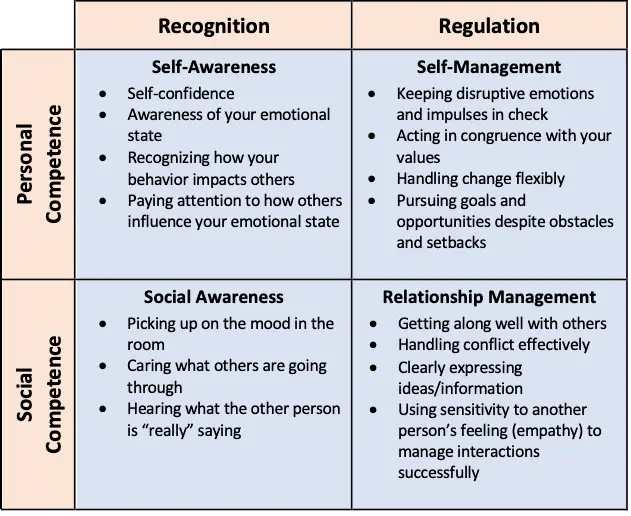Emotional Intelligence is all the things that make us as humans the squishy, emotional, loving, community-based species that we are. The shortest way to explain it is "emotional regulation" but of course, there are many layers inside of that. Emotional Intelligence is often also referred to as Emotional Quotient (EQ). This should maybe spark something in your brain about Intelligence Quotient (IQ). Think of it like EQ is the Yin to the IQ Yang. For many years, IQ was highly valued and studied. Recently, research shows high EQ is actually more likely to determine success. But that doesn't belittle the importance of IQ. In fact, signs point that high EQ is associated with high IQ and vice versa.
Traits of IQ
- Visual and spatial processing
- Knowledge of the world
- Fluid reasoning
- Working memory and short-term memory
- Quantitative reasoning
Traits of EQ
- Identifying emotions
- Evaluating how others feel
- Controlling one's emotions
- Perceiving how others feel
- Using emotions to facilitate social communication
- Relating to others
Emotional Intelligence is really about knowing yourself on a deeper level, knowing your emotions and how they make you interact with the world around you, knowing both your strengths and your weaknesses, and being able to communicate all that jumbled mess out to everyone else. Ohio University discusses these five main qualities of EQ: self-awareness, self-regulation, empathy, motivation, and social skills. Of those, one of the most reoccurring words in EQ is empathy. And I have a lot to say about empathy, but I will save that for a future blog post. It is one of my favorite words. But Daniel Goleman, author of the 1995 book Emotional Intelligence broke EQ into 4 subsections: self-awareness, self-management, social awareness, and relationship management. So basically, EQ is about awareness and management in yourself and others.

EQ is often associated with strong leadership skills. One of my feel-good, inspiring, go-to-pick-me-up icons is Brené Brown. (I am almost certain you will be hearing about her in the future of this blog) She talks a lot about the importance of leading vulnerably, with empathy, in touch with your emotions, and from your heart. That sounds like a leader with emotional intelligence to me.
Now, why am I talking about this on a space blog? As we expand out into the universe and start considering these long-duration missions to the Moon or Mars (or further) in a small tin can with limited resources and multiple crew members all with different backgrounds and cultures... Emotional Intelligence is the key to making sure we don't kill each other in space. Space is hard, I think we all know that. We don't need to make it harder by adding interpersonal conflict and emotional turmoil to that list of high risks.
Human error is, in fact, most likely the most accident-causing issue here on Earth. Loretta Whitesides talks about this in The New Right Stuff. Even in the seemingly logical engineering world, ego and hubris can prevent us from asking for help or double-checking our work. Shame or imposter syndrome stops us from asking questions or speaking up when something in our gut doesn't seem right. And when we are talking about humans in space, we could be talking about life and death. Here is one of my favorite passages from Loretta's book:
"The space industry has tried to put in more and more layers of safety, requirements, and process to compensate for lack of trust, communication, excellence, humility, and teamwork in a typical office environment. But no matter how many processes you impose, if the individuals and the team are not operating from integrity, love, trust, and communication... our teams will still not be working at their highest capacity. Moreover, we will not achieve what we are capable of as a species."
The good news is we don't have to wait to go to space to fix this. We can start working on developing EQ here on Earth. And better yet, we have to do it together! More on how to do that later.
We have established this is an important thing to talk about when we are considering space travel. So why is nobody talking about it? if you google "Emotional Intelligence in Space" the first seven articles are about CIMON and developing Artificial Intelligence to have Emotional Intelligence to support astronauts on missions. This would lead the average google to believe we are more interested in programming EQ than we are in developing it in our astronauts. Now is this true? Probably not, we know NASA and other entities have research in diversity, mental health, crew dynamics, and more. But when you google "Emotional Intelligence in the Military", many amazing articles, interviews, research papers, and blogs immediately pop up, giving diverse thoughts and a common emphasis on EQ, including this one from Space Force.
So let's talk about it! My goal is to facilitate this conversation on emotions. Not just for our future space explorers, but for mission control, the engineers and scientists, and the families of the crew, spreading out our EQ circle further and further. Not only will it help us stay alive in space, but it will also make Earth a better place to live too. The good news is you can train and increase your EQ. Similar to how memory activities, exercise, learning a new language or instrument, and reading can increase your IQ. I will write more on how to train your EQ but I can tell you it takes a lot of time to reflect on how you and others are acting, active listening and calming intense emotions. This is why I have placed such an emphasis on mindfulness and being present in my blog and social media recently. I also want to add that there is a growing interest in EQ for analog astronauts such as this paper with an Israeli crew. Another way to train your EQ is to go on an analog mission and get involved with the Analog Astronaut community.
Talking about Emotional Intelligence is going to be a core theme of my platform coming up. Normalizing the balance between EQ and IQ is crucial and part of my mission in preparing us all to go to space. In the spirit of honesty, I sometimes struggle with my EQ. I feel I am hyper-aware of my emotions and the emotions of those around me and I even can be quite good at managing my relationships. But as a highly emotional person (and I really do mean I feel EVERYTHING very deeply) I feel I have a hard time managing and regulating my most intense emotions. I have learned the best way to manage them is to give myself grace when I mismanage them and find my balanced center again.
In the future, I will talk more about how to develop your Emotional intelligence and what that looks like specifically for future space explorers. But don't worry, my Earth-bound-by-choice friends will gain much as well. I hope you spend this week reflecting on your emotions. Which quadrant of the chart is your strongest area? Which is your weakest?

From: Quotacy
Such an important blog, Bailey! EQ is important on Earth but vital in Space! “Emotional Intelligence is the key to making sure we don’t kill each other in space.” – is so true and proved by For All Mankind Show! The comparison table helped to see the difference between IQ and EQ. Loved the mention of The New Right Stuff book!
You suggested that wonderfully!
Space has been around for hundreds of years, but scientists still don’t know much about it. I’m not sure that emotions will teach us the rest about space, but they did once teach me about the power of California Highway Patrol. Space police might learn a thing or two from those rowdy deputies